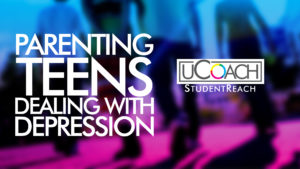Un-Distorting Your Teens Thinking: Part 1 Cognitive Distortions
Watch our video on how to help your teen change their thinking!
1. Changing Your Teens Thinking
Today we’re going to talk about cognitive distortions.
Cognitive equals your brain, your mind, your thinking.
It’s the gray gooey stuff that makes you, you.
17th century French philosopher, René Descartes, said “ergo coito sum”, I think therefore I am. Thinking equals your existence.
Cognitive distortions are ways of thinking about things that are inaccurate or biased.
Your brain is working against you. Not all the time, but the battle of your inner world is between you and an external enemy, it’s between you and your own worst enemy, also you.
A lot of our problems and self-destructive behavior are artifacts of another time. Another time in history or another time in your own life.
If you lived 1000 years ago, not trusting the tribe a few valleys away might result in your tribe being wiped out.
Mistrust of the other used to keep your ancestor’s tribe safe, now it makes you an ignorant bigot and sabotages your own life and hurts others too.

For others, it’s not a genetically programed bias to overcome, but something from your own past.
For instance, people that experience abuse as a child become usually guarded in a way that makes it hard to form deep relationships.
The mechanism that once protected you now hurts you.
As a good friend of mine who worked with troubled teens his life once told me, the things that were once essential to your protection are things that you need to protect yourself from.
I co-created a youth life coaching program that has been sued to mentor and coach over 3000 teenagers and its primarily built around the concepts of cognitive behavioral therapy or CBT.
In this article, I want to talk to you about what cognitive distortions are and cover four common cognitive distortions that teenagers deal with.
I’ll also tell give you a few tools to break the habits.
2. What are cognitive distortions?

Cognitive distortion are really just biases in your mind that cause irrational behavior.
We unknowingly re-enforce these irrational thoughts and beliefs over time until they become a part of our everyday thinking that we don’t recognize. They become “our truth.”
While we might celebrate someone speaking “their truth,” this isn’t always a good thing if your truth isn’t true.
Worse yet, if “your truth” is causing you or other damage, you should try to recognize your bias and correct patterns of thinking so that your destructive behavior changes over time.
There are many cognitive distortions, but they all have three things in common:
They are a pattern of thinking
That is false or inaccurate
And has the potential to cause damage to you of someone else.
No one likes to admit something they think is wrong. The word “actually” has been identified as the world most annoying word.
Also Read: Dealing with Teen Depression [2021]

We don’t like to be corrected. But it helps to realize three things:
- Everyone has cognitive distortions –You might be thinking, I’m sure other people do have false belief patterns, but not me.” Well, that’s a cognitive distortion right there called the Always right fallacy. See, fun already.
- You can overcome these false beliefs – It might some work and some blows to your pride, but you can and must work against the false thing patterns of thinking that are sabotaging you.
- Your adjustments to your thinking will change your behavior – Your behaviors begin in your thoughts and your habits are determined by your thinking patterns. Change those patterns and you change your behavior almost automatically. For example, its hard to lash out in ager about something you aren’t angry about and it hard to get angry at someone when you noodle though the fact that it’s not them, it’s you. Get it?
By the way, cognitive distortions, for reasons that will become obvious, correlate with depression, which is something teens already struggle with, so this is a break these false thought biases are key to good mental health for teenagers.
Before I get to the first three cognitive distortions, let me say this.
I’m not a therapist, but I am an expert at dealing with teenagers. I know how to speak to them, motivate them and help them change before it’s too late.
I’ve spoken all over the world to and about teenagers. I’ve worked with schools and law enforcement in helping teenagers, I travel with hundreds each year on volunteering trips and I’m a parent to two teenagers.
As I present these, I will present them like I’m talking to you so you can do the same with your teenager or you could watch this with them.
It’s also possible you might just see yourself in these and I’m tricking you into dealing with your own stuff.
3. 3 Cognitive Distortions Common to Teenagers:

Personalization
is taking things personally when they aren’t about you at all (or probably aren’t about you).
You might often assume you are intentionally targeted or excluded. If someone is upset, it’s probably because they are mad at you.
If something bad happens, it’s because you caused it. If it rains, it’s the universe bullying you.
Consequences: Personalization has been associated with anxiety and depression.
Examples: 1) Your friend is rude to you and you conclude that something is wrong with you, when really is was your friend being unkind.
2) Someone is looking your direction while laughing and you assume they are laughing at you when it really could have been anything.
How to deal: Explain to yourself that there are many reasons why things happen, and it is unlikely that you are the center of attention, but even if you are, you don’t control and can’t be responsible for everything everyone else does.
Jeff: You aren’t the center of the universe; people don’t think about you as much as you think they do. And even if they do, there’s nothing you can do about it, so do your best to let it go.
Myth of Fairness

Myth of Fairness is when you get resentful because you think you know what it fair, but you feel that people or things that happen aren’t fair to you.
When you expect everything to be fair, but realize it usually isn’t, you can become frustrated and feel like a victim.
Consequences: People who feel constantly victimized can become chronically angry and easily set off.
Examples: 1) You perceive that your parents favor one of your siblings or another person more than you. You see this favoritism in everything.
2) Everyone else gets a raise and work and you become angry. You believe you have been targeted.
How to deal: Challenge your assumptions that everything should and can always be fair. Realize that sometimes you will be treated unfairly in your opinion and sometimes you will get favored treatment.
Think of things that you have to be thankful for instead of focusing on the never-ending list of things that others have that you don’t have. Realize you may have to work just as hard or harder than others to get the same results.
Jeff: Hey, wouldn’t it be nice if everything was always fair? We can and should fight for justice, but we can’t let injustice ruin our lives and relationships, because injustice will always exist. Someone else will always have it better than you, but there are those who will always have it worse.
Double Standards
 Double Standards is when you hold others to a different set of standards than you hold yourself to.
Double Standards is when you hold others to a different set of standards than you hold yourself to.
Consequences: frustrations from unmet expectations and relational tension in your most important relationships.
Examples: 1) You lie to your parents when backed into a corner but hold them to an incredibly high standard for truthfulness, even referring to broken promises or mistakes as lies.
2) You judge others by their worst actions and judge yourself by our best intentions.
How to deal: Commit to assuming the best instead of the worst for others when different possible motivations might be possible.
Recognize that people not only make mistakes but will sometimes intentionally wrong you and offer the same forgiveness you wish to receive.
Jeff: People aren’t perfect. They lie, they are selfish, the do things wrong and sometimes they make mistakes. You should be used to it because you do it all the time. Don’t set unrealistic standards for the behavior and motivations of others.
Also Read: Suicide Prevention Practices for Schools
4. Three common methods of changing through patterns:

1. Telling yourself the truth
This taking false or exaggerated statements and using reason to turn them to the truth.
This is useful in every distortion, but I’ll use personalization as an example.
The False or exaggerated statement is, “The kids at school were looking at me and laughing today and made me feel like garbage. Everyone hates me.”
This is when we work to reform this statement to something that is true like:
“I know those kids were laughing when they looked at me, but they could have been laughing at someone else. Even if they don’t like, other people do like me and I couldn’t make everyone like even if I tried.”
2. Changing he/she/they or you to I
This when we change the external forces that control us to internal reactions, we take responsibility for.
Here we change, “The kids at school were looking at me and laughing today and made me feel like garbage. Everyone hates me.”
To “The kids were laughing, and I let it get to me. I know they can’t ‘make’ me feel anything because I control my own emotions.”
Also Read: Dealing with Teen Depression [2021]
3. Gratitude:

This is finding a way to be thankful for what we have instead of what we don’t.
Instead of “The kids at school were looking at me and laughing today and made me feel like garbage. Everyone hates me.” We look for things we are grateful for.
“The kids at school were looking at me and laughing today, but even if they don’t like me, I am grateful to have so many people who value me and love me.”
If this all sounds cheesy, too bad it works. I have been using these three tools since college and they have helped me overcome insecurity, anger, jealousy, and a victim mentality.
I also use them with my teenagers and every teenager I have ever worked with. Why? Because these tools work.
We only talk about a few cognitive distortions but there are more and you can read about them here.
5. Balancing Truth and Empathy
Even when we are trying to correct negative thinking patterns, we need to balance truth with empathy. If your teenager doesn’t think you care (even when you know you do), it’s unlikely they will listen to you.
Make sure they feel heard and that you ask questions that lead them to the conclusions they need to come to. Just telling them that they are believing lies—or worse, they are just “believing a cognitive distortion”—when they are upset about something probably won’t work.
Make sure you listen to them and show that you really care. Otherwise, your “help” will come across as a “lecture” –the dreaded description of a parent trying to help but not “getting it.”
My suggestion is that you address these issues when the teen isn’t in the middle of an emotional meltdown. Using other people as examples can also help them from being defensive.
But just being a listening ear isn’t being a parent or other adult of influence. They have friends who will listen, so you have to be an adult who helps change things. Don’t expect these ideas—which are very counterintuitive to people who are more emotionally than cognitively oriented—to land on open ears.
But keep trying. This is important.
Let us know in the comments below how recognizing these cognitive distortions have helped you!
About the Author: Jeff Devoll
Jeff Devoll, executive director of StudentReach, is an international speaker, trainer, facilitator and mentor to students and leaders.
Jeff has spoken to over 1,000,000 people from 40 states and 40 countries.
But Jeff is more than a speaker, he and his team have taken more than 8,000 volunteers on domestic and international “expeditions” to help schools and impoverished people around the world.
More than 3,000 students have been mentored through StudentReach’s mentoring and coaching programs, most of them highly at-risk students.








Leave a Reply
Want to join the discussion?Feel free to contribute!